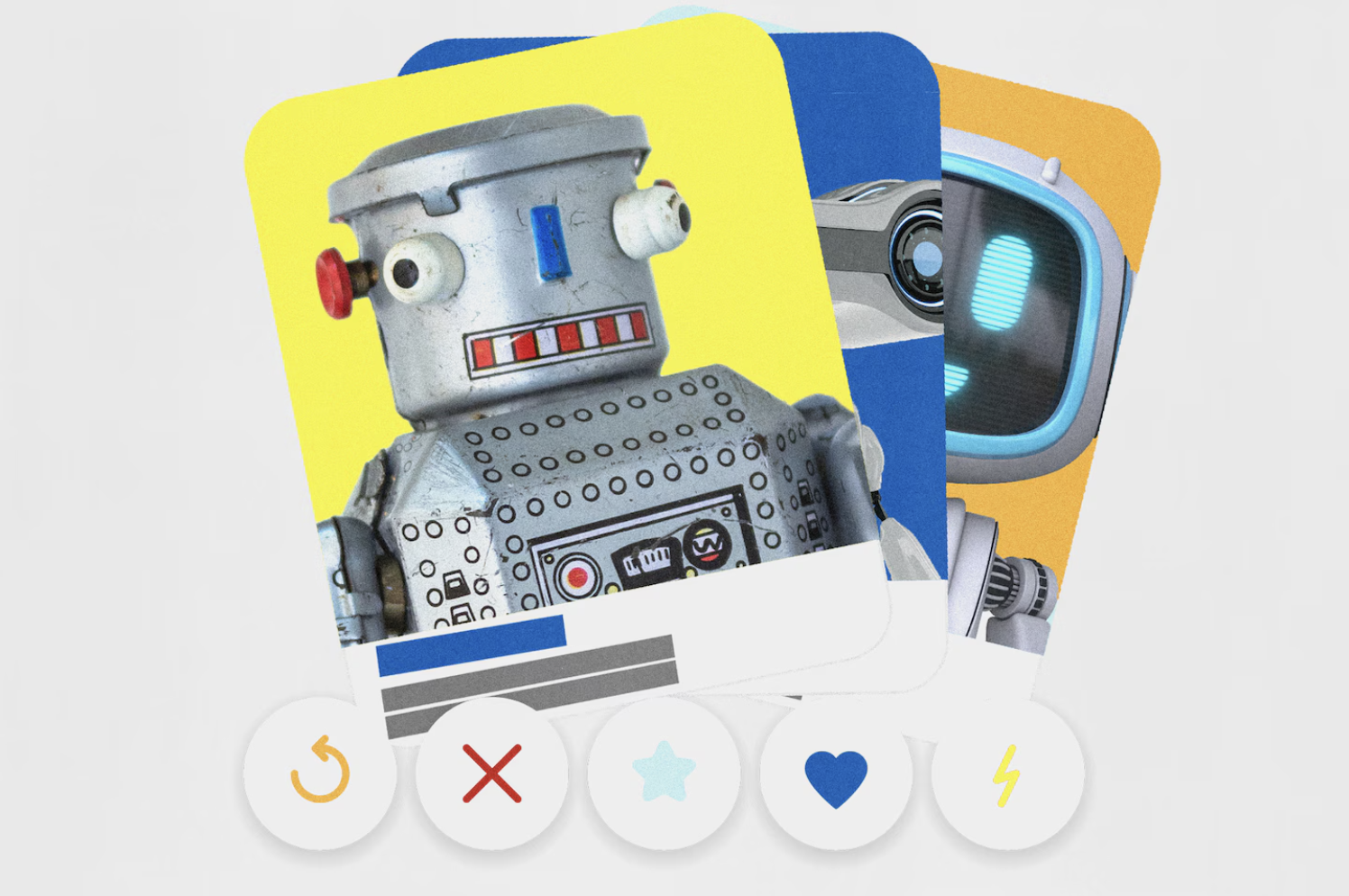For the last 12 months, I have witnessed the online dating industry adopt progressively more aggressive AI technology to help users improve their photos, profiles and chat up lines - and in doing so, they are creating a fake online world where users are craving authenticity and genuine connections.
Last week the Wall street Journal reported how AI is making everyone on dating apps sound charming:
Richard Wilson thought he’d discovered the elusive “spark.” For weeks the 31-year-old software engineer traded multi-paragraph messages with a woman who—unusually for a dating app match—remembered details and volleyed back thoughtful questions.
Yet the in-person date was a clunker. Her small-talk bore little resemblance to the lyrical texts, and when she matter-of-factly mentioned “using ChatGPT all the time at work,” Wilson left wondering whether he had fallen for her—or for her prompt engineering. “It’s almost like we never even spoke,” he said.
A Charm Offensive Written by Bots
That mismatch is becoming common as generative-AI plug-ins like Rizz and Wing promise to do the flirting for you, and incumbents such as Match Group integrate text-rewriting and photo-grading directly into Tinder and Hinge.
Hinge’s newest feature scans profiles and photographs, recommending punchier prompts and swapping out images that “convert” better, while Tinder silently reads every message, nudging users to rethink anything distasteful.
Roman Khaves, co-founder of Rizz, argues the tools simply “give great guys who aren’t great texters a chance to be seen.”
From a product standpoint the pitch is irresistible: remove conversational friction, widen the top of the funnel and convert more paying subscribers. Yet it also means the average dater can no longer assume that clever banter reflects the person on the other side of the screen.
The line between augmenting a user and impersonating them is suddenly blurry, and no one—including the companies shipping the tools—can articulate precisely where it lies.
Psychologist Amanda Gesselman, who studies dating behavior for Match Group, concedes the ethics are fuzzy: re-touching a photo feels deceptive, but outsourcing every text “amplifies” personality—until it doesn’t.
Authenticity Under Assault
Generative text doesn’t merely polish grammar; it scrubs away the micro-signals daters rely on to detect red flags. “Normally you can see if someone jumps to sexual stuff quickly, whether their jokes land, how they navigate awkward moments,” says veteran coach Erika Ettin. “When a bot is chatting for them, you can’t collect those data points anymore.”
Giada Pistilli, principal ethicist at Hugging Face, likens an AI-generated love letter to a Hallmark card with the price sticker still attached: once you discover the artifice, the sentiment evaporates.
The stakes are higher than bruised egos.
Nearly one-third of U.S. adults have tried a dating app, and academic studies now estimate that most new relationships in the United States begin online. If users decide the digital introductions are fundamentally untrustworthy, the industry’s growth trajectory reverses overnight.
Moderation or Surveillance?
Match Group frames its AI infusion as a safety upgrade.
Head of trust and safety Yoel Roth says a real-time “Are you sure?” prompt persuades roughly 20 percent of senders to delete an offensive or creepy message before it lands.
But achieving that win requires the company to parse every flirtatious DM in real time. That trade-off—marginally safer chats at the price of pervasive monitoring—has not been put to voters or regulators, and many users bristle at the idea that the app reads their most intimate texts before a potential partner does.
Data-hungry design crops up elsewhere.
Hinge’s profile rewrite bot asks for more granular biographical tidbits; message-polishers must ingest chat logs wholesale. Dating coaches report that some clients already suspect the extra prompts are “collecting data for nefarious purposes,” not just better matches.
Monetization Meets the Moral Wall
Critics warn that AI’s real function is less cupid than casino.
Generative features keep conversations inside the walled garden—exactly where subscription upsells and à-la-carte boosts live.
A class-action lawsuit filed last month alleges Match Group deliberately designs “addictive loops” that prioritize engagement over successful pairings.
Company spokespeople call the suit “ridiculous,” insisting their algorithms funnel users toward real-life dates.
For now, the clash highlights a larger question: when an app’s revenue depends on swipes, does any AI optimization create perverse incentives to keep you single?
The Red-Flag-Free Feed
Generative models are statistical parrots; given enough user input they converge on the same witty one-liners. The result, says LA-based “dating executor” Eve Tilley-Coulson, is a bland monoculture of profiles that “all sound like they were written by the same consultant.”
Worse, AI moderation often filters out the very “rough edges” that help daters gauge compatibility.
What remains is sterile, sanitized banter—safe enough to avoid offense, but too generic to kindle real chemistry.
For Wilson, that sterility translated into weeks of investment he’ll never get back.
“If she’d had to write the messages herself, maybe I’d have clocked the mismatch sooner,” he says.
Daters Go Analog—Again
Predictably, a counter-trend is simmering: real-world speed-dating nights, “touch-grass” mixers and even handwritten personal ads have begun to reappear.
One shuffle-style event in San Francisco charges $25 for a dozen ten-minute mini-dates, and attendance is climbing precisely because singles “love the novelty of meeting in real life,” according to organizer Austin Yeo.
Industry fatigue is compounded by scams and AI-generated fake profiles; 40 percent of North American users have encountered a scam, Kaspersky estimates.
Dating coaches, once enthusiastic evangelists for Hinge and Bumble, now counsel clients to “stop swiping and start talking to strangers at coffee shops.”
The sudden embrace of awkward face-to-face encounters feels less like nostalgia than signal hunger: tone of voice, nervous laughter, genuine surprise—data points no algorithm can fake.
What Founders and Investors Should Track
So what will the winning Online Dating Business look like 12 months from now?
- Trust is the moat. Biometric video intros or limited-time “AI disclosure” badges may seem clunky, but they could become table stakes if users demand proof of humanity.
- Design for rapid hand-off. Every extra AI layer delays the moment two people decide whether to split a dessert. Apps that shorten that path—even at the cost of screen time—will bank long-term credibility.
- Regulatory fog is rolling in. Content-moderation algorithms already draw scrutiny; once those systems also compose messages, they blur into deceptive-advertising territory. A proactive transparency program beats litigation.
- Hybrid models beat pure play. A portfolio that pairs digital discovery with curated micro-events hedges against a full-scale offline pivot.





